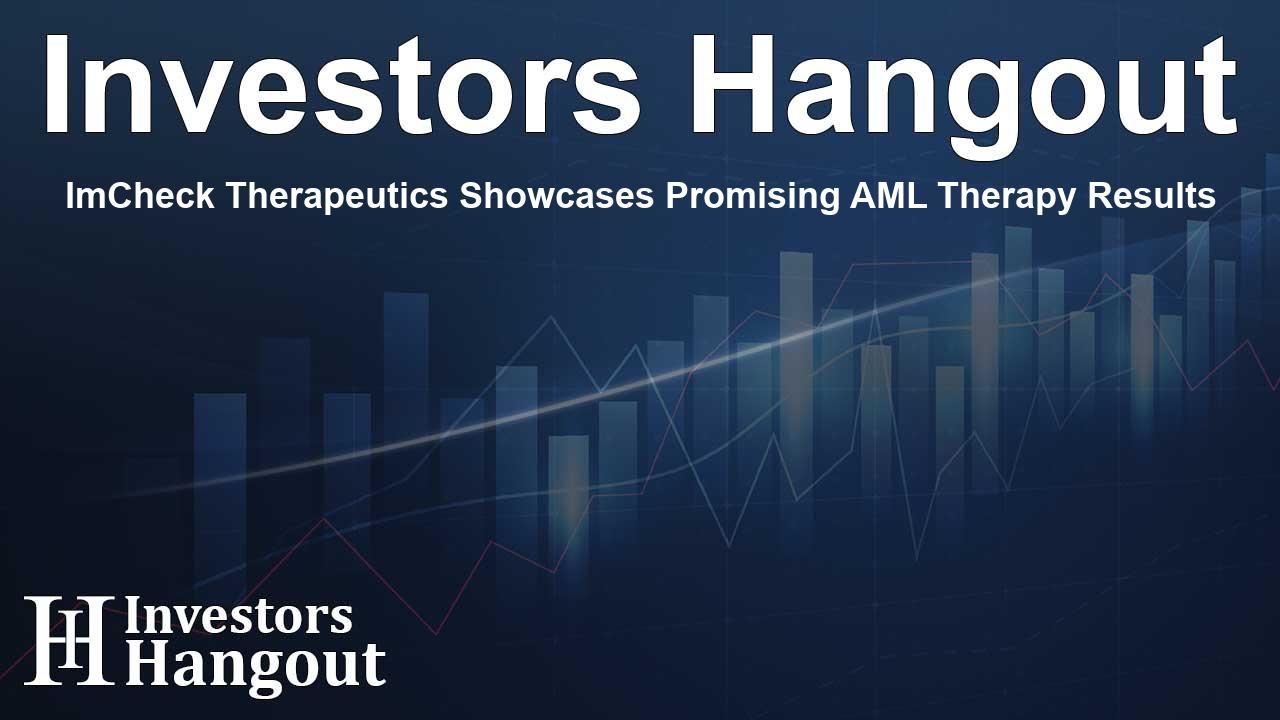ImCheck Therapeutics Showcases Promising AML Therapy Results

ImCheck Therapeutics Highlights Promising Results in AML Treatment
ImCheck Therapeutics recently shared significant progress in treating acute myeloid leukemia (AML) patients using ICT01 in combination with azacitidine and venetoclax at an esteemed conference. This revelation is crucial for those newly diagnosed by showcasing high remission rates across various molecular subtypes, suggesting an innovative approach in cancer treatment.
Exceptional Remission Rates Observed
The combined therapy achieved an impressive 96% composite complete remission (CRc) rate, with complete remissions (CR) reaching 74%. What stands out is not just the number but the efficacy observed across patients who typically have tougher prognoses. This advancement gives hope to patients typically seen as difficult to treat due to their genetic profiles.
Safety Profile and Proposed Dose
A noteworthy aspect of ICT01 is its favorable safety profile, consistent with expected side effects of Aza-Ven treatment. With Grade ?3 adverse events mostly linked to standard hematological toxicity and the effects of the disease, ICT01 demonstrates a manageable safety outcome. Moving forward, the proposed dose of 10 mg will be central to upcoming clinical trials.
Understanding the ASCO Presentation
The oral presentation at a prominent oncology meeting added to the excitement around ICT01. With scheduled times and rooms set, these results are paving the way for future discussions on treatment protocols aimed at challenging forms of AML.
Key Highlights of the EVICTION Study
Delving deeper into the EVICTION study—a first-of-its-kind clinical trial aimed at assessing ICT01—suggests an urgent need for better therapeutic options in AML. The trial specifically targeted populations that lack alternatives due to either age or physical fitness, demonstrating remarkable efficacy.
Results and Patient Outcomes
At the January data cutoff point, 45 patients with an age range from 51 to 87 participated in this essential research, a testament to the committed pursuit of advancing AML treatment. The majority of these patients had adverse or intermediate-risk mutations, generally linked with limited therapeutic responses. Yet, the trial defied expectations: particularly, those with TP53 mutations exhibited CR and CRc rates of 60% and 83%, respectively, showcasing ICT01's potential in treating high-risk populations.
Long-Term Survival and Safety
With a median follow-up of 8.5 months, the long-term response data indicates promising overall survival rates. Although preliminary, the findings reveal critical insights into how ICT01 can support improved durations and patient outcomes, establishing its potential to reshape treatment landscapes.
Looking Ahead: Opportunities for AML Patients
“Patients with newly diagnosed AML invariably have limited treatment avenues, especially those categorized with high-risk features,” stated the Chief Executive Officer of ImCheck Therapeutics. He emphasized ICT01’s ability to engage unique T cells could potentially provide transformative care for these underserved patients—and the findings are indicative of a shift in clinical approaches in AML.
With identified enthusiasm for accelerating ICT01's development, the company plans to explore its efficacy not just in AML but also beyond, potentially addressing other hematologic malignancies and solid tumors. Medical experts involved echo the sentiment, recognizing ICT01’s innovative engagement mechanics as a vital progression in oncology therapeutics.
Understanding ICT01 and Its Mechanism
ICT01 is a monoclonal antibody adept at activating ?9?2 T cells, known for their role in immune responses against malignancies. Such mechanisms can act as catalysts for heightened immune activity against tumors. Given the overexpression of its target on various cancer types, ICT01 represents a beacon of hope in redefining immuno-oncology strategies.
Frequently Asked Questions
What is ICT01?
ICT01 is a humanized monoclonal antibody that activates ?9?2 T cells involved in the body's immune response to cancers.
What were the remission rates observed with ICT01?
The combination therapy achieved a 96% composite complete remission rate, with 74% reaching complete remission.
What is the proposed dose for further trials?
The proposed dose for clinical development of ICT01 is 10 mg.
How does ICT01 enhance treatment for difficult AML cases?
ICT01 effectively engages T cells, improving response rates in patients with high-risk genetic mutations.
What are the future plans for ICT01's clinical development?
ImCheck Therapeutics plans to advance ICT01 in upcoming trials for AML and explore its efficacy in additional cancers.
About The Author
Contact Thomas Cooper privately here. Or send an email with ATTN: Thomas Cooper as the subject to contact@investorshangout.com.
About Investors Hangout
Investors Hangout is a leading online stock forum for financial discussion and learning, offering a wide range of free tools and resources. It draws in traders of all levels, who exchange market knowledge, investigate trading tactics, and keep an eye on industry developments in real time. Featuring financial articles, stock message boards, quotes, charts, company profiles, and live news updates. Through cooperative learning and a wealth of informational resources, it helps users from novices creating their first portfolios to experts honing their techniques. Join Investors Hangout today: https://investorshangout.com/
The content of this article is based on factual, publicly available information and does not represent legal, financial, or investment advice. Investors Hangout does not offer financial advice, and the author is not a licensed financial advisor. Consult a qualified advisor before making any financial or investment decisions based on this article. This article should not be considered advice to purchase, sell, or hold any securities or other investments. If any of the material provided here is inaccurate, please contact us for corrections.
